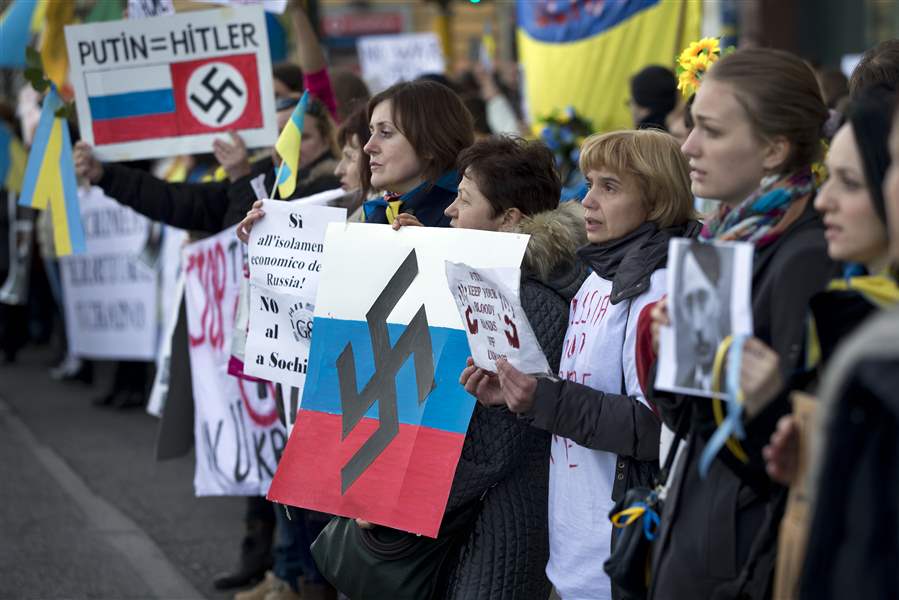
COMMENTARY
White House must act soon to avert disaster
Putin unlikely to be satisfied
3/3/2014
Ukrainians living in Italy voice outrage over Russia’s military intervention in the Crimea region during a protest at the Russian embassy in Rome.
ASSOCIATED PRESS

Sigov
Whatever the White House chooses to do about the Russian aggression in Ukraine — to rein Russia in or to appease it — the time to make that decision and then to implement it is now, before the situation spirals out of control.
■ Locals with ties to Ukraine watch crisis warily
■ Russia denies ultimatum to force Ukraine to submit
Russian troops have effectively severed the Crimean peninsula from Ukraine's mainland, securing Russia's control of the Kremlin's long-coveted region, which is home to Russia's strategic naval base not far from the Mediterranean Sea and which was a popular subtropical vacation destination in the largely frigid Soviet Union, before it fell apart in 1991.
There was hope that Russian President Vladimir Putin — clearly the mastermind of the Crimean annexation — may be content with winning that prize and not venturing outside the Crimean region.
That hope is running thin.
Mr. Putin has used the calls for intervention by self-proclaimed representatives of the Russian-speaking Crimean majority abetted by Russian special services as an excuse to move troops. He has also used the participation of more radical Ukrainian nationalists in the revolution that has just toppled a pro-Russian regime in Ukraine to claim that the revolution was a fascist putsch threatening the Russian-speakers in Ukraine. The Russian-speaking minority comprises slightly less than a half of Ukraine's population.
What very few in the United States understand is that the Russian annexation of Crimea is wildly popular in Russia, where thousands of people are marching in support of the Russian actions in Ukraine. True, some of them are government employees who were told to march, but the majority, by many accounts, are marching spontaneously.
Russia has never quite condemned or even made widely-known Joseph Stalin's atrocities in Ukraine, where millions of people died in the 1930s in famine deliberately organized by the Kremlin to eradicate a perceived existential threat presented by better-to-do Ukrainian peasants. Ukrainians did not forget, which explains their vehement opposition to the ensuing Russian domination and the resulting bad blood between the two people that are ethnically, culturally, and linguistically close.
Over the last 14 years, Mr. Putin has successfully played the same card before — in Georgia, a tiny republic in the southern former Soviet Union, finally sending troops there, and severing two provinces from Georgia proper in a brief military invasion in 2008.
With no reprisals from the West, including the United States, and now five years later, only Russia watchers remember that it even happened. But unlike Georgia, Ukraine is a vast country that is located in the center of Europe and borders on Poland, a NATO member who is extremely sensitive to Russian military exploits and has already placed its military on high alert.
This is no surprise given Poland's opposition movement's role in helping bring about the downfall of the Soviet Union, an event Mr. Putin has proclaimed “the greatest tragedy of the 20th century.”
What does come as a surprise though is the White House's self-admitted surprise at Mr. Putin's military campaign in Ukraine.
Not only did Russia's “little successful war” in Georgia aim at splitting up the country, but also at unsuccessfully ousting pro-NATO and pro-West leader Mikheil Saakashvili. And that's exactly what Mr. Putin is after now in Ukraine — to topple the new, pro-Western Ukrainian government.

Ukrainians living in Italy voice outrage over Russia’s military intervention in the Crimea region during a protest at the Russian embassy in Rome.
And just as in Georgia, Russia has tried every economic lever in its arsenal to bring Ukraine under its heel before interfering militarily — from boycotting imports to cutting energy supplies.
Moreover — while most United States experts agreed that Russia was not going to interfere in the Ukraine militarily — this columnist warned before the Winter Olympics in Sochi began last month that a Russian military aggression in Ukraine could begin as soon as the Games were over.
The Kremlin has made it known that a diplomatic solution in Ukraine is possible only if pro-Russian former Ukrainian President Viktor Yanukovych, who has fled to Russia, is returned to power and allowed to stay in power until a presidential election is held in December.
The White House has to make up its mind now whether it wants to oblige Mr. Putin or use every resource in its power to restrain him and keep him from spreading his military aggression into the predominantly Russian speaking regions of southern and eastern Ukraine, where Russians are already marching and calling for a wider Russian military intervention.
Washington can do several things, from seeing to it that Russia is kicked out of the G-8, to freezing the western bank accounts of Mr. Putin's rich cronies, to beefing up the European missile defense shield by putting up more radars and missile interceptors close to Russia's borders — something Mr. Putin appears to be genuinely afraid of, seeing it as tipping the so-called strategic nuclear balance in the favor of the United States.
The fear is that something akin to a 1938 crisis in the Sudetenland that pushed Europe to World War II may repeat itself. Just as Adolf Hitler assumed the role of the advocate of ethnic Germans living in Czechoslovakia, triggering the crisis, Mr. Putin is making himself into the advocate of the ethnic Russians living in the Ukraine.
Next to watch for is a growing concern that some of the so-called peaceful Russian troops in Crimea may change into Ukrainian military uniforms and shoot a few of their fellow Russian soldiers, triggering an uncontrolled chain of events.
Mike Sigov, a former Russian journalist in Moscow, is a U.S. citizen and a staff writer for The Blade.
Contact Mike Sigov at: sigov@theblade.com, 419-724-6089, or on Twitter @mikesigovblade.